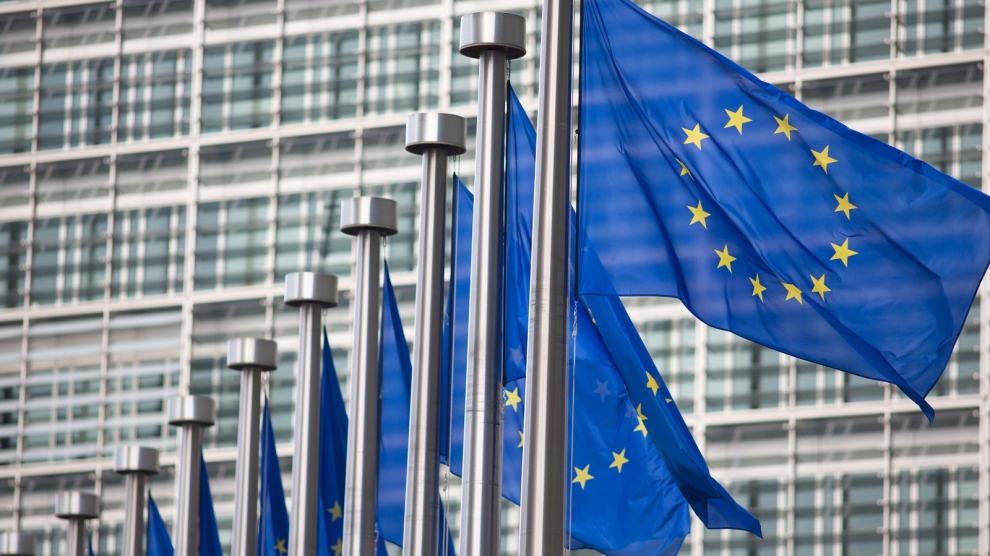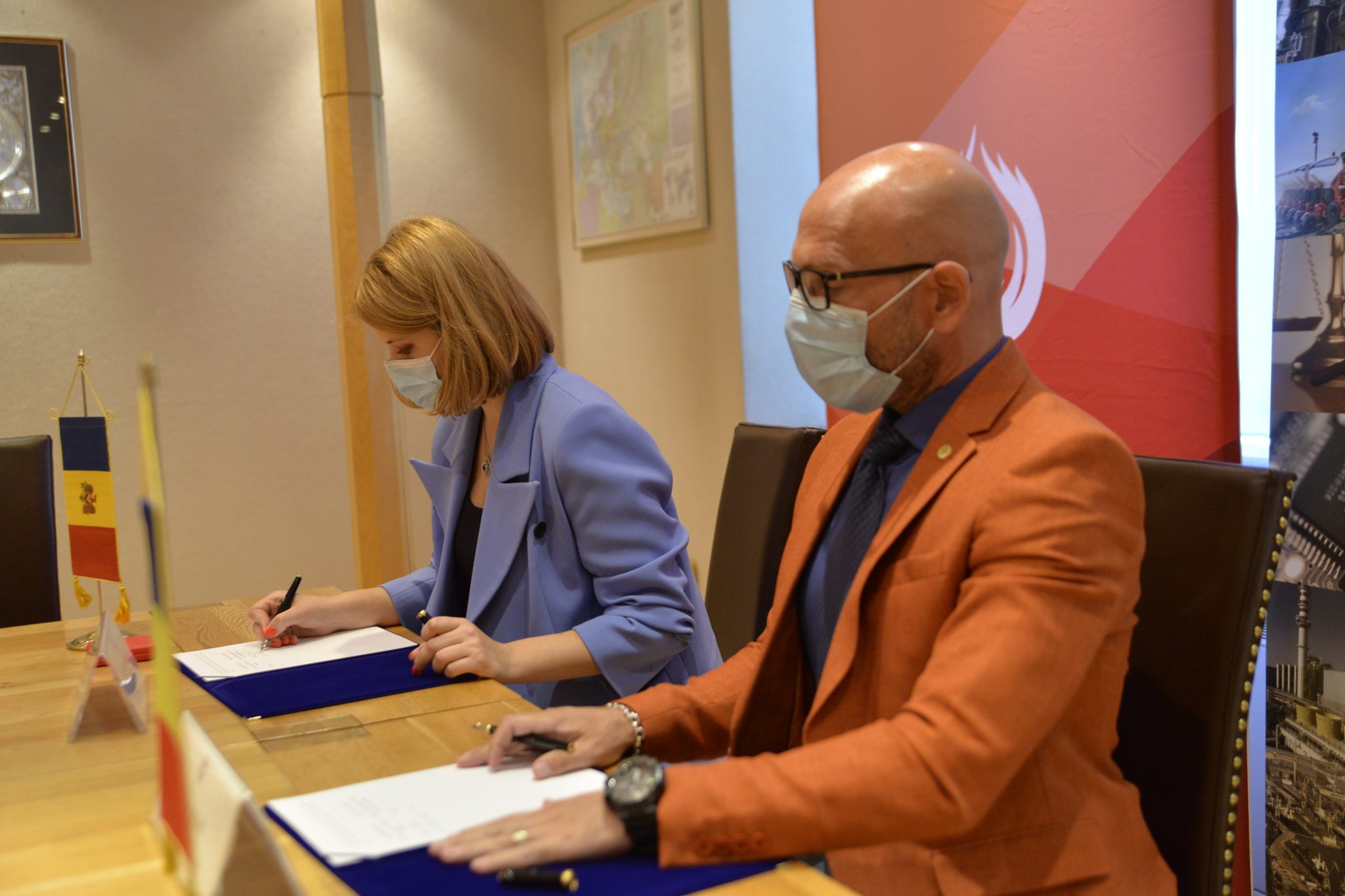Economy
IMF says Moldova speeds up economic restoration process
Reading Time: 3 minutes Filat said that, starting from 1 July 1011, the salaries of budget-paid auxiliary staff will increase by 8.5 per cent. As many as 125,000 people will benefit from this.
Prime Minister Vlad Filat and the head of the International Monetary Fund’s (IMF) mission, Nikolay Gueorguiev, held a news briefing on the results of the second on 2-16 February evaluation of the implementation of a memorandum signed between Moldova and the IMF, the government’s communications and press relations department has said.
The prime minister said that the economic programme implemented with the IMF’s support plays a crucial role in the restoration of stability and confidence in Moldova. The outcomes achieved in 2010 come to confirm the seriousness with which the government treats the commitments undertaken towards the citizens, as well as the relation with the development partners, including the IMF.
"The Gross Domestic Product (GDP) recorded a 6.9-per-cent increase in 2010, thus significantly exceeding the initial forecast for the last year (1.5 per cent), as well as the subsequently revised forecast (3.5 per cent)," the prime minister said. He stressed that GDP got back to the level registered before the economic crisis.
"We have managed to keep the inflation under control (8.1 per cent in 2010) and substantially cut the budget deficit to 2.4 from GDP (the initial forecast was 7 per cent, and then revised to 5.4 per cent). These notable results were attained despite challenges faced by our economy," Vlad Filat said.
The prime minister emphasized that the progamme with the IMF is carried out in the parameters that had been agreed upon and the government will soon shift to the implementation of measures and reforms envisaged in the agreement with the IMF. Also, the cabinet will start considering and adopting the 2011 state budget in a short time.
Filat said that, starting from 1 July 1011, the salaries of budget-paid auxiliary staff will increase by 8.5 per cent. As many as 125,000 people will benefit from this.
Also, the government will allocate social assistance for January, February and March 2011, according to the formula applied in late 2010. The retirees with pensions less than 900 lei and the families from the social assistance system are to benefit from this help. In March, they will receive an overall amount of 390 lei for the three months. The beneficiaries are 521,000 pensioners and 33,000 less well-off families.
The prime minister said that the annual indexation of pensions will be made on 1 April 2011. Also, the teachers’ salaries will rise by 12.5 per cent starting from 1 September 2011, after a previous increase of 12.5 per cent operated on 1 January 2011. As many as 69,000 teachers will benefit from this rise.
Vlad Filat also said that, starting from 1 September 2011, the civil servants’ salaries will grow by 12 per cent, with 21,000 people due to benefit from it.
The quantum of the minimal guaranteed social assistance income will increase from 530 to 575 lei. This will serve as a basis to extend the social assistance system by attracting new beneficiaries.
"An important thing that we achieved as a result of negotiations with the IMF is the removal of ceilings to local taxes, just as local authorities’ representatives demanded. This is a step forward and it fits into the government’s efforts to decentralize the power," the prime minister said.
Filat noted that, to carry out the things agreed upon with the IMF, the cabinet ruled to adjust the quotas of the excise duties on tobacco products and strong benerages starting from 1 April 2011. A 50-per-cent increase will allow increasing the budget’s revenues.
Vlad Filat said that the budget deficit agreed upon for 2011 will account for 1.9 per cent, in conditions of a 4.5-per-cent economic growth and an inflation rate of 7.5 per cent.
"The Moldovan government has a clear vision of the country’s economic development. Yet, to successfully implement it, it is necessary that each state institution fulfills its duty responsibly and devotedly," the prime minister emphasized.
The head of the IMF mission, Nikolay Gueorguiev, appreciated the results attained by the Moldovan authorities while implementing the Moldova-IMF memorandum, He confirmed that, at present, the sides reached an agreement that is to be approved by the IMF leadership and the Executive Board at a meeting scheduled for next April. Under the agreement, Moldova will receive 50 million special drawing rights (SDR) (about 77 million dollars) to consolidate the budgetary position and fill the currency reserves.
The IMF representative said that Moldova sped up the economic restoration process, which exceeded experts’ expectations. He added that the IMF expects a 4.5-5-per-cent economic growth and a 7.5-per-cent inflation in 2011-2012.
"We welcome the authorities’ decision to cut the budget deficit to the level of 1.9 per cent of GDP in 2011 and continue the budgetary adjustment process in 2012," Nikolay Gueorguiev said.
The official also said that the mission held discussions on concrete reforms, aimed at stepping up financial stability, enhancing efficiency in the public sector, improving the business climate, extending social assistance programmes, etc.
Economy
Moldova will receive a disbursement of 36 million euros as part of the the Economic Recovery Plan

This week, the European Commission approved the disbursement of 36 million euros in grant money for the Republic of Moldova. The announcement was made by Deputy Director-General for Neighbourhood Policy and Enlargement Negotiations at the European Commission, Katarina Mathernova, who paid an official visit to the Republic of Moldova between September 13-15, together with Managing Director for Russia, Eastern Partnership, Central Asia, Regional cooperation and OSCE, at the European External Action Service, Michael Siebert.
The EU officials had meetings with President Maia Sandu, Minister of Foreign Affairs and European Integration, Nicu Popescu, Speaker of Parliament, Igor Grosu, Prime Minister of the country, Natalia Gavrilita, as well as key representatives of Government, international financial institutions and the civil society, according to a press release issued by the Delegation of the European Union to the Republic of Moldova.
Beside such topics as the EU-Moldova relations and prospects, the priorities of the reform agenda of the new Moldovan Government, preparations for the Eastern Partnership Summit at the end of the year and the Transnistrian conflict settlement, the officials also discussed the EU assistance in support of reforms and the Economic Recovery Plan for Moldova, which was announced in June with a total EU support of 600 million euros over the next 3 years.
“The first measures under the Economic Recovery Plan will shortly materialize, with the expected disbursement of 36 million euros in grant money under budget support programmes to support the authorities’ efforts to fight against the consequences of the pandemic. Moldova can count on EU’s assistance on its path to reforms and to recovery, bringing tangible results to citizens,” Katarina Mathernova stated.
The plan is based on assistance provided by the European Union through various bilateral and regional instruments, aiming to mobilize the funds in the form of grants, loans, guarantees and macro-financial assistance.
“The Economic Recovery Plan for the Republic of Moldova involves much more, not just this financial support provided immediately. It must help digital transformation, strengthen infrastructure, energy efficiency, education and support small and medium-sized enterprises,” the EU official also said.
As Prime Minister Natalia Gavrilita informed, “The Economic Recovery Plan and the 5 flagship initiatives for Moldova in the Eastern Partnership will directly contribute to the reform and consolidation of institutions, stimulate long-term socio-economic development, bring direct benefits to citizens, and unleash new economic opportunities through promoting the green agenda and digitization. Small and medium-sized enterprises (SMEs) have been hit hard by the crisis. Promoting and diversifying access to finance and reducing collateral requirements will be essential in supporting economic operators. We are grateful to the EU partners who will launch two programs to support 50 000 independent Moldovan SMEs to adapt to the new conditions.”
President of the Republic of Moldova, Maia Sandu, welcomed the decision of the European Union to disburse about 745 million lei in grant money, as the official page of the President’s Office announced. “EU support comes after a long period of freezing of European assistance, caused by former governments. We managed to relaunch the political dialogue with the European Union and resume financial assistance. The Republic of Moldova is gradually regaining the trust of its strategic partners. This European support is also a signal of encouragement for the new Government team in its commitment to clean up the institutions, fight corruption and launch development programs in the country,” said Maia Sandu.
Photo: unknown
Economy
Romania and Moldova signed a partnership memorandum pledging to cooperate in promoting their wines

The Chamber of Commerce and Industry of Romania (CCIR) and the National Office for Vine and Wine (NOVW) of the Republic of Moldova signed, last week, a memorandum of cooperation on organizing joint promotional activities in the markets of common interest, as the CCIR announced.
China, Japan or the USA are just some of the markets targeted by the Romanian and Moldovan institutions. The memorandum also involves advertising activities for wines from common indigenous varieties, promoting the oeno-tourist region, developing a tourist route in the two states, exchange of experience, study visits, and mutual support in identifying new export opportunities. “We are very confident that this collaboration between our organizations will lead to sustainable economic growth and a higher degree of well-being among Moldovans and Romanians,” claimed Deputy Secretary-General of CCIR, Bogdan Visan.
On the other hand, Director of the NOVW, Cristina Frolov, declared that no open competition with Romania is aimed at the governmental level of the Republic of Moldova. “This request for collaboration is a consequence of the partnership principle. Romania imports 10-12% of the wine it consumes, and we want to take more from this import quota. Every year, the Romanian market grows by approximately 2.8%, as it happened in 2020, and we are interested in taking a maximum share of this percentage of imported wines without entering into direct competition with the Romanian producer,” the Moldovan official said. She also mentioned that Moldova aims at increasing the market share of wine production by at least 50% compared to 2020, and the number of producers present on the Romanian market – by at least 40%.

Source: ccir.ro
**
According to the data of the Romanian National Trade Register Office, the total value of Romania-Moldova trade was 1.7 billion euros at the end of last year and over 805 million euros at the end of May 2021. In July 2021, there were 6 522 companies from the Republic of Moldova in Romania, with a total capital value of 45.9 million euros.
The data of Moldova’s National Office of Vine and Wine showed that, in the first 7 months of 2021, the total quantity of bottled wine was about 27 million litres (registering an increase of 10% as compared to the same period last year), with a value of more than one billion lei, which is 32% more than the same period last year. Moldovan wines were awarded 956 medals at 32 international competitions in 2020.
Photo: ccir.ro
Economy
Moldova’s hope to be a top walnut exporter and its main difficulties

The Republic of Moldova has perfect weather conditions for growing walnut trees, that creating a great potential of walnut production and trade, especially on international markets, where the demand is way higher than the product’s supply. National and international experts believe that the country’s walnut production industry is on the verge of important transformations, which could lead to increased yields, quality and competitiveness worldwide.
According to authorities, Moldova exports 34-35 thousand tons of walnuts in shell, which is about 7% of the total export of fruit and 5% of the total export of horticultural products. The export value is assessed as being $120 million, that being 57-60% of the total fruit export value and about 50% of horticultural export value. Most of walnut crops are exported to the EU countries, such as France, Germany, the Netherlands, Romania and Austria. The country’s exports were among the world’s top 10 when it comes to the highest dollar value of the product during 2020.
Viorel Gherciu, Minister of Agriculture and Food Industry, pointed out that the production in the domestic walnut industry has increased by 55% in the last five years, which ranks Moldova among the main producers in the world.
“The biggest opportunity for this industry is that we are in the geographical proximity of the largest walnut import area in the world, which is the European Union, with almost 40% of total imports in the world. We are on the EU border, with privileged relations, with an Association Agreement. We already enjoy a good relationship in working with European importers, they trust our processors. A very close collaboration has been created and this is, in fact, the guarantee for those who invest in the area,” claimed the president of the Walnut Producers Association, Oleg Tirsina.
The data provided by the National Bureau of Statistics show that there are 34.7 thousand hectares of walnut plantations in the country. 20.90 hectares are represented by orchards. 75% of planted orchards are formed of old varieties trees. 30-35% of the exported production comes from orchards, the rest comes from individual farmers and plantations along the roads. This means that the quality of walnut production is not at its maximum potential. Developing commercial plantations through orchards modernization and extension of walnut varieties would provide double yield and better quality, experts say.
Governmental support in the form of subsidizing solutions, foreign investments and credit options are indispensable for the industry development. One of the financing options is the credit line of the European Investment Bank Project. Since 2016, 15 producers and processors of nuts, almonds and hazelnuts have benefited from these loans with the total amount of investments worth 8.7 million euros. A further extension of the project would provide another 60 million euros for the modernization of the horticultural sector in general and for harvesting organic walnuts in particular.
Photo: heymoldova.com





















